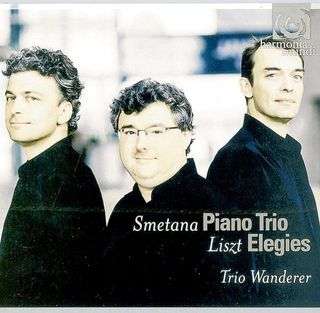|
Back
03/02/2011
Franz Liszt: Tristia – Die Zelle in Nonnenwerth – Romance oubliée – Elegies nos. 1 & 2 – La Lugubre Gondole
Bedrich Smetana: Trio for piano, violin and violoncello, op. 15
Trio Wanderer: Jean-Marc Phillips-Varjabédian (violin), Raphaël Pidoux (violoncello), Vincent Coq (piano)
Recording Teldex Studio Berlin (September 2009) – 72’33
harmonia mundi HMC 902060 – Booklet in French, English, and German

For the Romantic composers of the 19th century sadness, mourning, and death were among their favorite subjects and cause for commemoration. The somewhat macabre elements of the funeral march were cultivated with an obsessiveness by Berlioz, Liszt, Chopin, Tchaikovsky, Saint Saëns, Gounod, and even Beethoven and Mahler. Who could forget the powerful funeral marches in the Eroica Symphony of Beethoven or the first symphony of Mahler? The third movement, Marche funébre, of Chopin’s second piano sonata is one of the most recognizable pieces in the entire 19th century piano repertoire. Poignant and heart rending compositions on a smaller scale dealing with the idée fixe of death were often labeled as Elegies. Massenet’s mournful Elegy is popular not only as a vocal solo, but is often performed on cello, violin, or other instruments.
This beautiful new recording by the Trio Wanderer of elegiac music by Liszt and Smetana incorporates some really obscure rarities with a major piano trio sonata. The music is haunting, often profound, and immensely enjoyable. The Trio Wander plays with an unfailingly rich sound and enormous depth of feeling. They also play with unusual flair and understanding for this particular style of music. For chamber music buffs, or anyone who enjoys great music making, this CD will make an excellent addition to your collection.
Bedrich Smetana based his piano trio on the grief he felt over the death of his eldest daughter Bedriska, who had succumbed to scarlet fever in 1855 at the tender age of four and a half. All three movements are in g minor and based on a leitmotiv expressive of sobbing or morning. The Trio provides ample moments for passionate outbursts from all three of the instruments, and indeed, they respond with bold and captivating playing in these rather bravura moments.
For my own personal tastes, the Liszt pieces are even more compelling and totally unfamiliar. The titles themselves, Tristia or Romance obliée, tell you explicitly the nature of the works. They are distinctly unusual however in the freedom of their compositional style and are designed to transport you on a reflective journey down the hidden paths and byways of melancholy melody. You may find yourself dabbing away a furtive tear or two. I did.
Micaele Sparacino
|